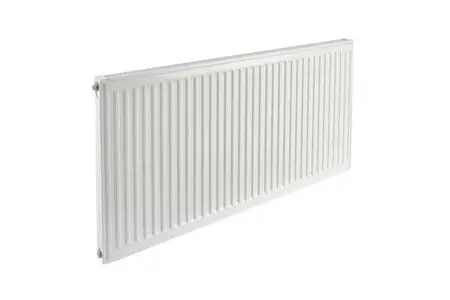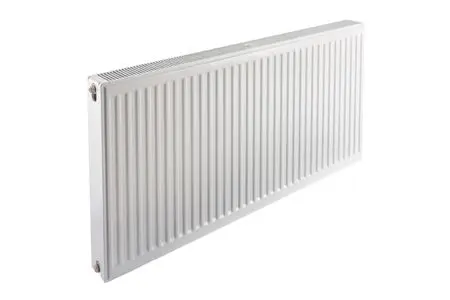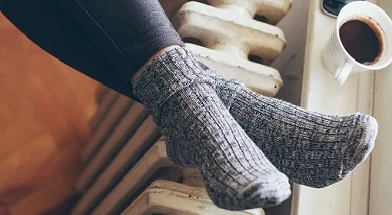 Free delivery on orders over £75 ex VAT
Free delivery on orders over £75 ex VAT Free click & collect from branches nationwide
Free click & collect from branches nationwideChoosing the right panel radiator is crucial for efficient and effective heating. The main difference between a single panel and a double panel radiator is their heat output, which is determined by their design and surface area.
When helping customers select the best radiator for their space, a key decision is often whether to go with a single panel or a double panel model. The choice depends on a variety of factors, including the size of the room, your customer’s heating requirements, and the available space.
At City Plumbing, the home of heating, we stock a spectacular range of single and double panel radiators from renowned brands at some of the most competitive prices. Here we consider the main difference between the two, highlighting the benefits of each choice.
What Are Single Panel Radiators?
Also known as Type 11 radiators, a single panel radiator has one main panel and one set of convector fins attached to the back. This design results in a lower heat output compared to a double panel radiator of the same size.
Best For:
- Smaller rooms: They are well-suited for small bedrooms, bathrooms, hallways, or utility rooms where a high heat output is not necessary.
- Spaces with limited wall space: Their slim profile means they don't protrude far from the wall, making them ideal for narrow corridors or areas where space is a concern.
- Well-insulated homes: If your customer's home is modern and well-insulated, a single panel radiator might be all they need to maintain a comfortable temperature.
Potential Drawbacks:
- They may struggle to heat larger or poorly insulated rooms effectively.
- They can be less energy-efficient in larger spaces, as they have to work harder and for longer periods to reach the desired temperature.

What Are Double Panel Radiators?
Also known as Type 22 radiators, a double panel radiator features two panels and two sets of convector fins in between. This increased surface area allows them to generate significantly more heat than a single panel radiator of the same dimensions.
Best For:
- Larger rooms: They are the go-to choice for living rooms, open-plan spaces, and large bedrooms that require a higher, more consistent heat output.
- Homes with poor insulation: If your customer has an older home with large windows or poor insulation, a double panel radiator can compensate for heat loss more effectively.
- Faster heating: They are excellent for quickly bringing a chilly room up to a comfortable temperature.
Potential Drawbacks:
- They are bulkier and protrude further from the wall, which can be an issue in tight spaces.
- They are generally more expensive to purchase and require more water to heat up, which can mean higher running costs, although they are more efficient at maintaining temperature in the right setting.
- Your customer will need to ensure that their boiler can handle the higher hot water demand.

Which Panel Radiator Should You Choose?
The decision between a single and double panel radiator boils down to a simple calculation: the room's heating needs vs. the radiator's heat output.
- Calculate BTU: The most reliable way to choose is to use a BTU (British Thermal Unit) calculator. This tool will consider the room's dimensions, window size, and other factors to give you a specific heat output requirement.
- Match the Output: Once you have your BTU number, you can select a radiator (single or double) that meets or slightly exceeds that requirement.
By taking these factors into account, you can select the best radiator for each room in your customer's home or building, ensuring both comfort and energy efficiency.

FAQs Customers Ask About Panel Radiators
UK customers often have a number of key questions when trying to decide between a single and a double panel radiator. These questions usually revolve around heat output, energy efficiency, cost, and practical considerations like size and installation. Here we answer some of the most common ones:
What's the main difference in heat output?
This is the most fundamental question. The simple answer is that a double panel radiator generates significantly more heat than a single panel radiator of the same size. This is because it has a larger surface area from its two panels and the extra set of convector fins. This makes it more effective at heating a room, especially larger or poorly insulated ones.
Which one is better for my room?
The choice depends entirely on the room's size and your heating needs.
- Single panel (Type 11) radiators are generally better for smaller rooms like a small bedroom, bathroom, or hallway where you don't need a high heat output. They are also ideal for spaces with limited wall space due to their slimmer design.
- Double panel (Type 22) radiators are the recommended choice for larger rooms, open-plan living areas, or older homes with poor insulation, as they can heat the space more effectively and efficiently.
Do double panel radiators cost more to run?
Yes, they do. Because a double panel radiator has a larger volume to heat, it requires more water and energy to get to the desired temperature. However, for a large room, this doesn't mean it's less efficient. A double panel radiator will heat the room faster and maintain a consistent temperature, which can be more cost-effective in the long run than having a smaller, single panel radiator that has to work constantly and struggle to heat the space.
What about the size? Will a double panel radiator fit?
This is a common concern. Double panel radiators are thicker and protrude further from the wall. While the height and width might be the same as a single panel radiator, their increased depth can be an issue in narrow spaces, behind doors, or in hallways where you don't want an obstruction. Single panel radiators are a great space-saving option for these areas.
Can I just replace my single radiator with a double one?
Yes, in most cases, but it's important to consider two things:
- Boiler Capacity: A double panel radiator will place a higher demand on your central heating system. You should check if your boiler is capable of handling the extra demand. It's often recommended to consult a heating engineer.
- Pipework: The new radiator might have different pipe connections or brackets, so you may need to adjust the existing pipework.
What's a BTU and why is it important?
BTU stands for British Thermal Unit. It's a measure of heat output. To choose the right radiator, you should calculate your room's BTU requirement. This is the most accurate way to ensure you're getting a radiator that is powerful enough to heat your space efficiently without being oversized and wasting energy.
Choose City Plumbing For Panel Radiators
City Plumbing is proud to offer a vast selection of single panel radiators and double panel radiators. With some of the most sought-after brands available in the industry, such as Myson, Halcyon, Purmo, and Stelrad, and featuring a huge choice of colours, finishes, heat output, and dimensions, there’s a panel radiator type to suit every customer preference.
City Plumbing can help you choose the best products for the job. Take a further look at our website for more products and helpful advice on how we can help you keep your customers warm this season.

